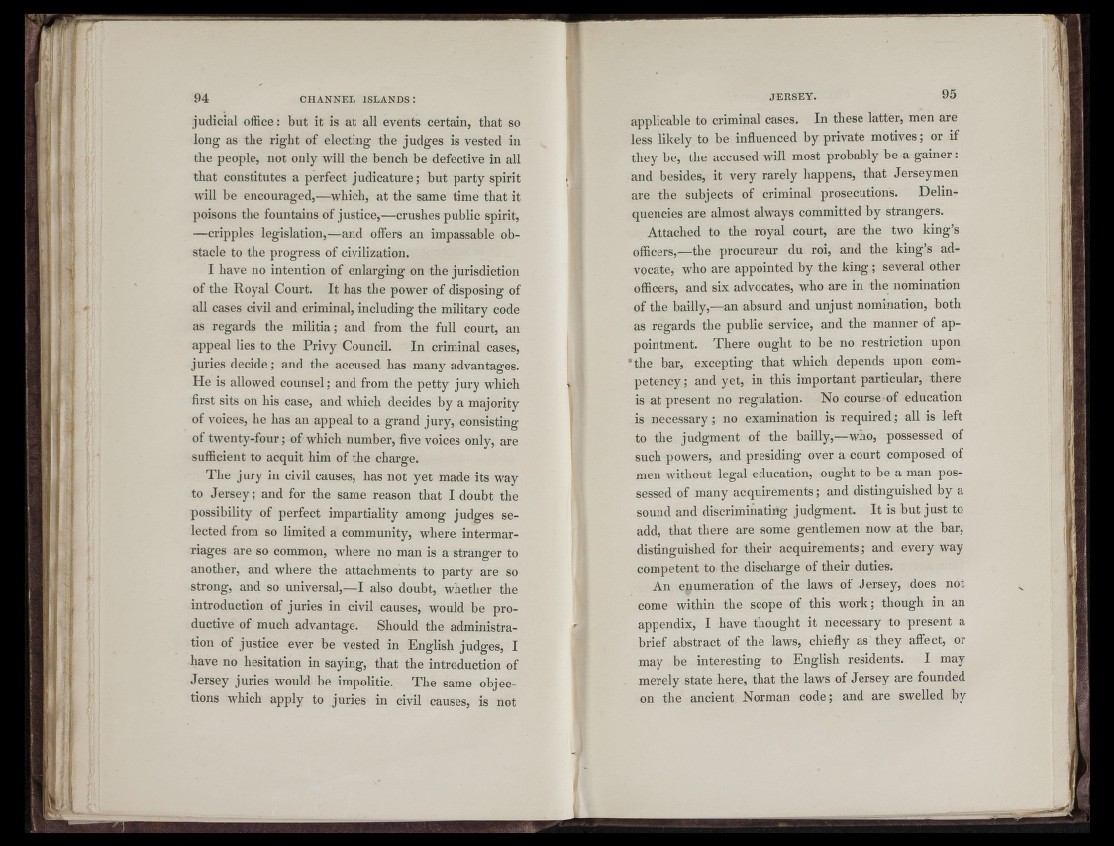
judicial office: but it is at all events certain, that so
long as the right of electing the judges is vested in
the people, not only will the bench be defective in all
that constitutes a perfect judicature; but party spirit
will be encouraged,—which, at the same time that it
poisons the fountains of justice,—crushes public spirit,
—cripples legislation,—and offers an impassable obstacle
to the progress of civilization.
I have no intention of enlarging on the jurisdiction
of the Royal Court. It has the power of disposing of
all cases civil and criminal, including the military code
as regards the militia; and from the full court, an
appeal lies to the Privy Council. In criminal cases,
juries decide; and the accused has many advantages.
He is allowed counsel; and from the petty jury which
first sits on his case, and which decides by a majority
of voices, he has an appeal to a grand jury, consisting
of twenty-four; of which number, five voices only, are
sufficient to acquit him of the charge.
The jury in civil causes, has not yet made its way
to Jersey; and for the same reason that I doubt the
possibility of perfect impartiality among judges selected
from so limited a community, where intermarriages
are so common, where no man is a stranger to
another, and where the attachments to party are so
strong, and so universal,—I also doubt, whether the
introduction of juries in civil causes, would be productive
of much advantage. Should the administration
of justice ever be vested in English judges, I
have no hesitation in saying, that the introduction of
Jersey juries would be impolitic. The same objections
which apply to juries in civil causes, is not
applicable to criminal cases. In these latter, men are
less likely to be influenced by private motives; or if
they be, the accused will most probably be a gainer:
and besides, it very rarely happens, that Jerseymen
are the subjects of criminal prosecutions. Delinquencies
are almost always committed by strangers.
Attached to the royal court, are the two king’s
officers,—the procureur du roi, and the king’s advocate,
who are appointed by the king ; several other
officers, and six advocates, who are in the nomination
of the bailly,—an absurd and unjust nomination, both
as regards the public service, and the manner of appointment.
There ought to be no restriction upon
'th e bar, excepting that which depends upon competency
; and yet, in this important particular, there
is at present no regulation. No course of education
is necessary; no examination is required ; all is left
to the judgment of the bailly,—who, possessed of
such powers, and presiding over a court composed of
men without legal education, ought to be a man possessed
of many acquirements; and distinguished by a
sound and discriminating judgment. It is but just to
add, that there are some gentlemen now at the bar,
distinguished for their acquirements; and every way
competent to the discharge of their duties.
An enumeration of the laws of Jersey, does not
come within the scope of this work; though in an
appendix, I have thought it necessary to present a
brief abstract of the laws, chiefiy as they affect, or
may be interesting to English residents. I may
merely state here, that the laws of Jersey are founded
on the ancient Norman code; and are svvelled by
iA ,